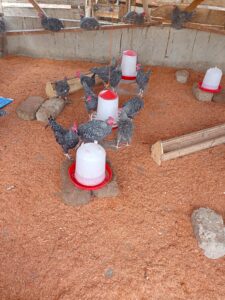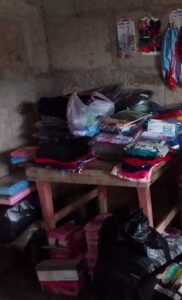
Combating COVID-19 with better nutrition: What an Iowa organization is doing in Central America
This article was originally published by the Des Moines Register online on Jul.16, 2020 and in print on Jul. 19, 2020.
By Jerry Perkins, Self-Help International Board Member and former farm editor for the Des Moines Register.
The COVID-19 pandemic is intensifying the impact of the twin scourges of disease and malnutrition in the world, but there is hope that new bio-fortified crops being introduced by organizations like Iowa-based Self-Help International can help combat the new coronavirus.
Nutritional experts say that well-nourished people can better ward off such diseases as COVID-19, and bio-fortified crops have been shown to lessen the pandemic’s impact.
In addition to its work introducing crops with added nutrition, Self-Help is working in Nicaragua to improve water quality for 85,000 people in 95 communities and to provide micro-credit support for women entrepreneurs and farmers in rural Nicaragua. Self-Help is also providing health information for the promotion of sanitary practices that will lessen the spread of the coronavirus.

Double-rows of bio-fortified beans.
Self-Help International’s efforts to introduce bio-fortified beans that have been augmented with added iron and zinc have now reached 167 farm families since Nov. 12, 2019, when I witnessed the first distribution of the beans to 30 members of the farmers’ cooperative in Los Chiles, a rural area in southeastern Nicaragua. Each of the 30 farmers from the Los Chiles co-op received 15 pounds of biofortified beans that had been developed at the International Center for Tropical Agriculture (CIAT is the acronym for its name in Spanish) in Colombia.
Also involved in the project is HarvestPlus, a Washington, D.C.-based organization that seeks to improve nutrition and public health by developing and promoting bio-fortified food crops.
HarvestPlus also supports the Nicaraguan Institute of Agricultural Technology, which sold 500 pounds of Rendidor bean seed to Self-Help for distribution to the Los Chiles co-op members. The remaining 50 pounds of Rendidor bio-fortified beans were planted in two Self-Help demonstration and experimental plots.
Rendidor beans contain 60% more iron (86 parts per million, or ppm) and 50% more zinc (43 ppm) compared with the traditional bean varieties grown in Nicaragua.
Added zinc in the beans will support the body’s immune system, which is critical to fend off diseases like COVID-19 and to heal wounds. The beans’ added iron is crucial for women of child-bearing years and especially for pregnant women, who experience increased blood volume and thus need iron to maintain healthy hemoglobin levels to transport oxygen throughout the body. For children, iron increases the formation of strong bones and teeth that will serve them well for the rest of their lives.
The Rendidor bio-fortified beans represent the first new crop introduced by Self-Help Nicaragua since 1999, when Self-Help began working in Nicaragua with the planting of Quality Protein Maize, or QPM, a high-protein corn variety that was developed at the International Maize and Wheat Improvement Center in Mexico.
This year, Self-Help also hopes to distribute bio-fortified rice to its cooperating farmers to strengthen its mission of addressing hunger and malnutrition among the most vulnerable people living in both urban and rural areas.
Self-Help has long focused on promoting the cultivation and consumption of crops that have good yields and improved nutrition. Adding bio-fortified rice and beans to the crops Self-Help promotes will help farm families help themselves and those who consume those foodstuffs by improving the nutrition of the three staple foods that make up a traditional Nicaraguan diet.

A member of the Los Chiles Cooperative holding Rendidor bean seeds.
Because Self-Help is adding bio-fortified rice and beans to the QPM corn on Nicaraguans’ plates, people who have not been able to have an adequately nutritious diet will now have food that is rich in protein, fiber, and essential micro-nutrients and will be better able to stave off the effects of COVID-19, should they contract it.
Farmers in the Los Chiles co-op who each received 15 pounds of the Rendidor seeds agreed to return 30 pounds of seed to Self-Help after harvest, multiplying the bio-fortified bean seeds available for distribution to more farmers in 2020. After paying back the “multiplier” beans, farmers were able to keep enough beans to feed their families for a year, save some of the beans for the next planting cycle, and sell the rest, helping to spread the benefits of the added nutrition.
In May, six months after that first distribution of bio-fortified beans, Self-Help distributed 1,710 pounds of bio-fortified beans to 137 farmers. The distribution included 900 pounds of beans for 70 farm families located in five communities on Ometepe Island and 810 pounds of beans for 67 farmers in three communities in the San Pedro de Lovago region.
Self-Help plans to expand its bio-fortified bean distribution to 253 farm families in October, when the second bean-planting cycle begins.
Jorge Campos, Self-Help’s Nicaragua country director, said that, despite the limitations on mobility and logistics caused by the coronavirus, the bean seeds were distributed successfully in time to make the crucial spring planting window for edible beans. Weather conditions also were favorable for planting this spring, he added.
With many food supply chains experiencing disruption globally because of the novel coronavirus, Campos noted, supporting Nicaraguan farmers to grow food to feed their families and their communities is important now more than ever.
“The health crisis that the country is going through brings with it an economic crisis,” he said, “but its effects will be lessened if our enterprising women, the leaders of our rural drinking water programs and the farmers we work with remain active, innovating and producing to alleviate the possibility of a food crisis.”

 Next Post
Next Post


